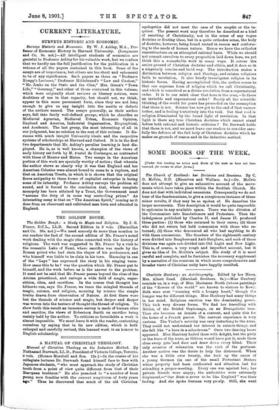A MANUAL OF CHRISTIAN THEOLOGY.
Manual of Christian Theology on the Inductive Method. By Nathanael Burwash, LL.D., President of Victoria College, Toronto. 2 vols. (Horace Marshall and Son. 12s.)—In the course of his collegiate lectures Dr. Burwash found himself face to face with Japanese students, "who must approach the study of Christian truth from a point of view quite different from that of their European brethren." He also preached to "a number of keen young men familiar with the current scepticism of forty years Igo." Thus he discovered that much of the old Christian apologetics did not meet the case of the sceptic or the in- quirer. The present work may therefore be described as a kind of resetting of Christianity, not in the sense of any vague doctrine or floating ideas, but in a quite orthodox sense, the body of doctrine, however, being found rooted in reason and conform- ing to the needs of human nature. Hence we have the orthodox superstructure on an attempted rational basis. "While we should not commit ourselves to every proposition laid down here, we yet think this a remarkable work in many ways. It covers the entire ground of Christian doctrine and ethics, and it does so in a singularly concise and lucid way. The introduction makes a distinction between religion and theology, and relates religious faith to revelation. It also briefly investigates religion in its historic forms. Having accomplished this, the author comes to that one supreme ferns of religion which we call Christianity, and which is conceived as a divine revelation from a supernatural order. It is to our mind clear that here is the crux,—Is there an invisible and supernatural order? Nearly all the scientific thinking of the world for years has proceeded on the assumption that there is not. Science has now got to the end of that narrow tether, and is feeling tentatively into the void. But that void is religion illuminated by the broad light of revelation. In that light is there any true Christian doctrine which cannot stand before both rational and historic criticism ? Dr. Burwash holds that there is not, and we must leave our readers to consider care- fully the defence of the full body of Christian doctrine which he makes on grounds of reason and in the inductive method.






































 Previous page
Previous page